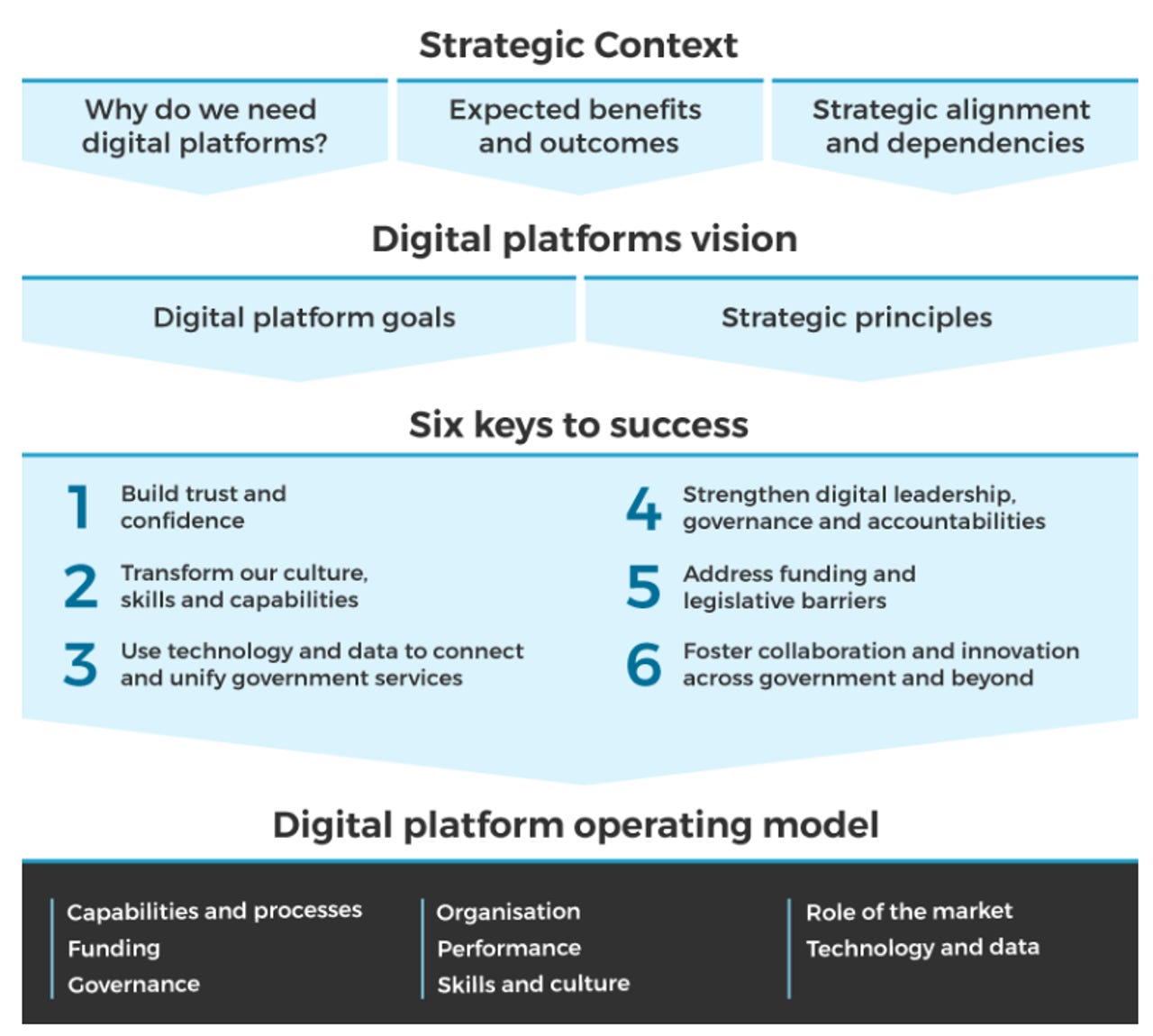Canberra launches 'reusable' digital platform strategy

The federal government on Thursday released its Digital Services Platform Strategy, which it said is aimed at providing common, reusable business capabilities that can be consumed by multiple government entities.
In delivering the strategy, the Digital Transformation Agency (DTA) said that at a whole-of-government level, digital service platforms will encourage innovation and interoperability between private and public; build public trust and confidence in government's handling of sensitive and personal data; support the integrity of the government ecosystem and the services offered; increase government's agility and responsiveness to change; and increase the efficiency and effectiveness of service delivery by shifting it to a digital means.

Digital Platforms Strategy Framework
According to the DTA, the new strategy will help enable the government's Digital Transformation Strategy, which was launched at the end of last month.
The strategy, the DTA said, is supported by the Digital Platforms Operating Model, and provides what it is calling the leading practice for the organisation, capabilities and processes, skills and culture, and technology and data applicable to digital platforms.
"A whole-of-government approach to developing government services is needed to ensure that these services are easily accessible, convenient, and meet user needs," the strategy says.
"This approach will enhance the value and experience delivered to people and businesses, while improving the efficiency and effectiveness of government."
In the strategy, the DTA highlights that reinventing the wheel every time a government entity wants to deliver a digital initiative is not efficient, and hopes this new document will set a standard for avoiding creating bespoke solutions when a sufficient one is already in place elsewhere.
"Agency specific approaches to delivering government services often lead to a fragmented user experience when using more than one government department or agency," the strategy continues.
"Developing reusable digital platforms of common business services will help reduce the burden on people and businesses, deliver greater benefits to the economy, and speed up digital transformation across government."
In the strategy, the DTA identifies six "keys" to success: building trust and confidence from the public; transforming public service culture, skills, and capabilities; effectively using technology and data; strengthening digital leadership, governance, and accountability; addressing funding and legislative barriers; and fostering collaboration and innovation across government.
Telling Senate Estimates in May that the Digital Platforms Strategy was on its way, DTA chief digital officer Peter Alexander said the strategy would help government deliver a number of services more effectively.
"If an agency is running a mainframe to deliver a particular type of service and another agency who interacts with them is running another type of technology -- x86, another type of infrastructure -- do we say they have to run the same? No, but what we say is they have to interoperate and there has to be standardisation, so we build to open standards so we can interoperate, and share data and systems," Alexander said at the time.
Of concern to the Finance and Public Administration References Committee was that not owning the intellectual property (IP) of what is used within the government means being bound to a particular vendor for upgrade and maintenance long-term.
In response, Alexander said in the instance where software is built either by or for the government with a vendor, the government will own the IP or at worse, the right to the IP.
See also: IBM scores AU$1b for whole-of-government IT
Platforms currently in development by the federal government include its online service portal myGov; Digital Identity, which will provide citizen verification and authentication; "Tell Us Once", which will see end-users only have to verify who they are once when moving between government services; Inbox, which the DTA has touted as a "robust Inbox capability" that allows consumers to receive and reply to messages; and Notifications, where users can determine how they receive government communication.
Also in the works is the myGov Dashboard, which will allow citizens to move between government services; Payments In, a payments transaction service; End user services, which the DTA described as supporting "improved service delivery and decision-making" through data; and Business Registers, which will centralise company information.
The strategy's launch also coincides with the release of a new whole-of-government platform, Service Connect, which Minister for Human Services and Digital Transformation Michael Keenan explained will connect Australians with service providers, beginning with one helping families access childcare.
The platform strategy also sits alongside the Secure Cloud Strategy, Hosting Strategy, the 2016-released Cyber Security Strategy, the Australian Signals Directorate's Information Security Manual, the DTA's ICT Procurement Reform, the Australian Public Service Commission's Building Digital Capability Program, and the Data sharing and release legislation.
RELATED COVERAGE
Australian government to bring all services online by 2025
The Coalition has labelled its own digital transformation strategy as a 'bold' plan that will make government accountable.
Commonwealth pushes public cloud by default
Spruiking a public cloud-first approach, the Australian government has lifted the lid off its new Secure Cloud Strategy.
The Australian government and the loose definition of IT projects 'working well'
Straight-faced, a Department of Human Services representative told a Senate committee its data-matching 'robodebt' project went well, because it produced savings.
This is fine: Australian government senators back current digital transformation path
Canberra has a 'coherent strategy' for digital transformation, government senators say, as opposition senators claim there is a lack of will.
Why Australia is quickly developing a technology-based human rights problem (TechRepublic)
Human rights advocates have called on the Australian government to protect the rights of all in an era of change, saying tech should serve humanity, not exclude the most vulnerable members of society.